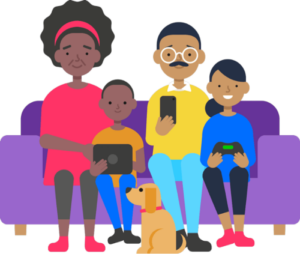Tuesday, February 12, 2019. UK. A new report into the online world of the UK’s most vulnerable children has revealed it is possible to predict online risks that different groups of vulnerable children may face online, such as pressure to be sexting, cyberbullying, cyber scams, or seeing content promoting self-harm, anorexia and suicide.
An estimated two million children considered to be the most vulnerable in society – including those with physical or mental health needs – face becoming ‘lost in digital space’, the report commissioned by Internet Matters reveals.
It concludes that specialised training and tools are required across all sectors to draw on the ability to identify the most likely online issues facing the highest risk children and trigger early intervention. It also calls for more intensive online safety education and support for these children.
The study, in partnership with Youthworks and the University of Kingston, used a robust dataset of vulnerable young people’s online experiences to identify how they might be more likely to encounter certain online risks.
It reveals how:
- Children in care and young carers are almost twice as likely to be cyberbullied than children who aren’t
- Over one in four (27%) of children with Special Educational Needs often view sites promoting self-harm compared to 17% of peers, while 25% often view pro anorexia sites in contrast to 17% of peers
- Young people with hearing loss were more likely than peers with no difficulties to be involved in sexting and five times more likely to say that the ‘internet often left me with thoughts and feelings that were upsetting’.
- Those with learning difficulties were one third more likely to spend more than 5 hours per day online than peers, and one third more likely to have their social media account hacked.
It includes insights and interviews with children living with one or more vulnerabilities, many of whom highlighted the benefits of having access to the internet which made them feel part of a community, removed communication barriers and “helps me deal with life”.
With research based on nearly 3,000 young people aged 10-16, the report has the support of the Digital Minister Margot James MP and Barnardo’s – the UK’s largest charity supporting vulnerable children – CEOP and the Children’s Commissioner Anne Longfield.
Carolyn Bunting, CEO of Internet Matters, said: “The research reiterates how society’s most vulnerable children need extra support and care in their digital lives – and how a child’s vulnerability might be an indication of the type of online risk they are more likely to experience.
“The report by Internet Matters and Youthworks is the first step towards finding a fresh, collaborative approach to helping vulnerable children use the internet well – benefiting from its resources while at the same time understanding the risks.
“It’s important to remember all the opportunities the online world can offer young people – for example, it gives young carers a place to connect with one another and combat feelings of loneliness.
“But if the risks are not addressed and openly discussed, these children could slip through the net and miss out on the many advantages and instead see their vulnerability used against them.”
Youthworks Director Adrienne Katz, who co-authored the report with
Dr Aiman El Asam, in partnership with Internet Matters, said: “A generation of vulnerable children are growing up without the digital support they need – effectively lost in digital space.
“There is a lack of training and up to date advice for those who live and work with vulnerable children. Their digital lives seldom receive the same nuanced and sensitive attention that ‘real life’ adversity tends to attract.
“At best they receive the same generic online safety advice as all other children, while specialist intervention is required.”
Digital Minister Margot James said: “As this research shows, with the rapid pace of technology we must ensure young people and those caring for them have the tools to face the challenges of the online world.
And government will soon be publishing a White Paper setting out clear responsibilities for tech companies to keep us safe online.”
Barnardo’s Chief Executive Javed Khan said: “The internet has transformed how young people learn, socialise and communicate – but sadly it also brings new dangers – including online grooming, cyber-bullying, gaming addiction and self-harm forums.
“And alarmingly, as the research by Internet Matters shows, vulnerable children are more likely to be at risk from online dangers than their peers.
“The report explains just why we need to incorporate online risks into assessments and support, and how vulnerable children need guidance when accessing the internet. This is about responding to children’s lived experiences in the digital age.”
EDITOR’S NOTES
The Cybersurvey is an annual survey of young people’s views and online experiences run by Youthworks from 2008 -2018. Currently 38,000 young people have participated. This research study explored responses from 2,988 of these young people aged 10 to 16.
Children who were considered vulnerable – were identified across five groups.
Family: Young carers and those in care -109; Communication difficulties includes those with speech of hearing difficulties and those who need help with English – 296; Physical disabilities includers those with any physical disability and vision problems or a long standing illness – 214; Special Educational Needs includes those with learning difficulties or other forms of SEN – 220; Mental Health Difficulties includes those with a self-reported mental health difficulty – 156






